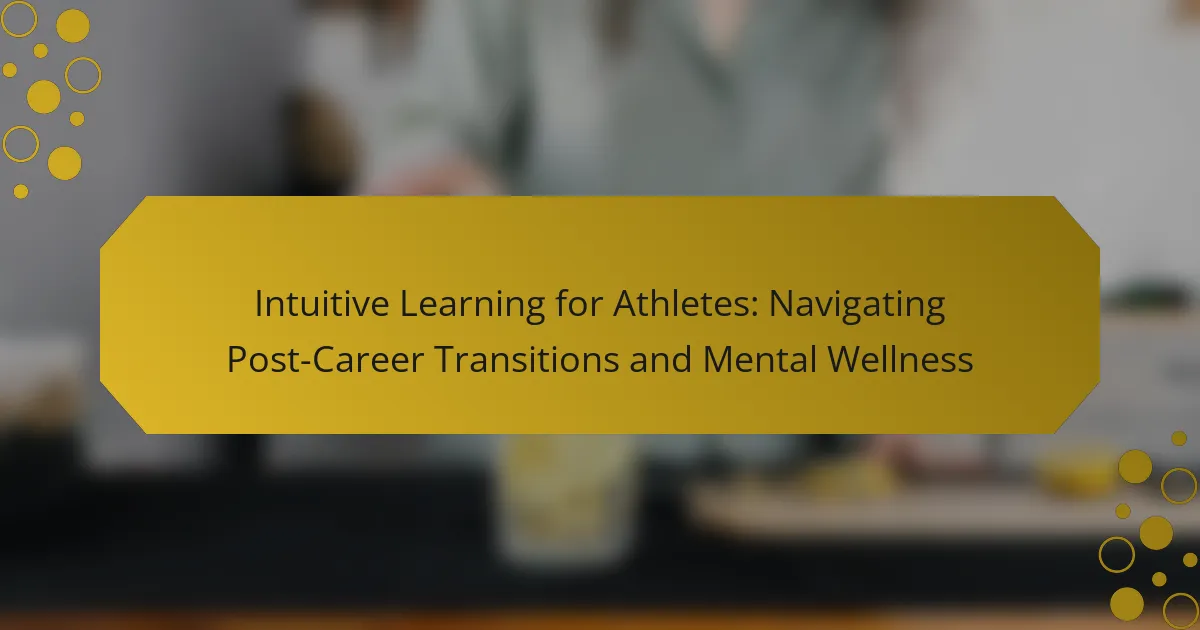Navigating post-career transitions can be challenging for athletes, often leading to mental health issues like anxiety and depression. Intuitive learning fosters self-awareness and adaptability, enabling athletes to manage these changes effectively. Key strategies include mindfulness practices, setting realistic goals, and engaging in supportive peer networks. Accessing specialized resources can further enhance mental wellness and resilience during this critical life phase.
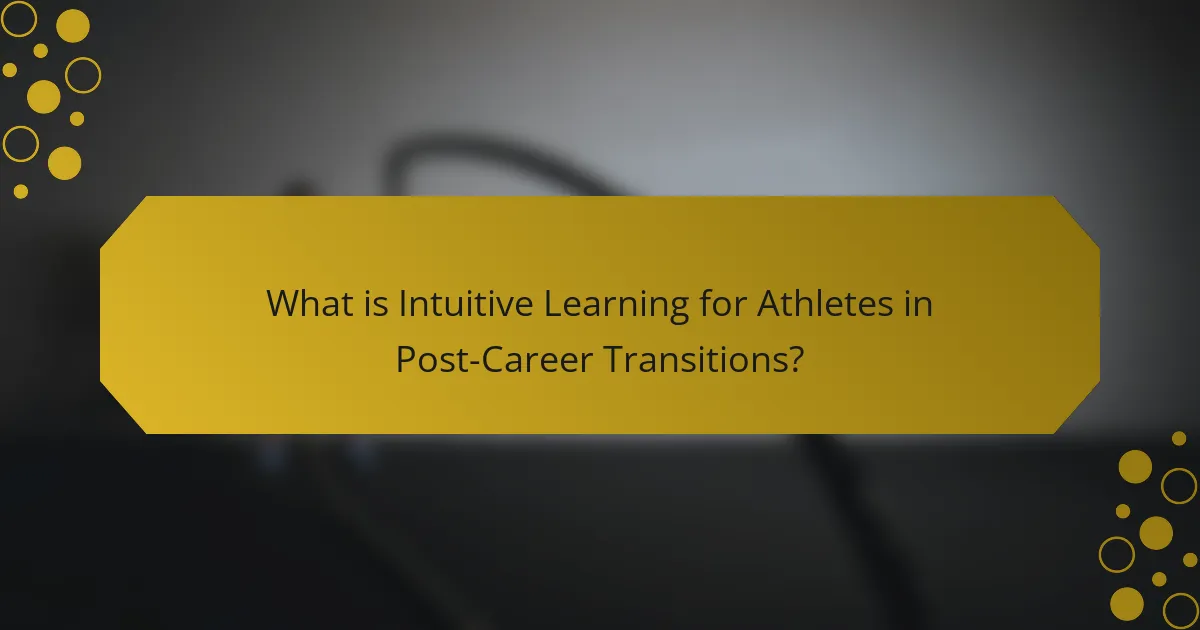
What is Intuitive Learning for Athletes in Post-Career Transitions?
Intuitive learning helps athletes transition post-career by fostering self-awareness and adaptability. This approach emphasizes mental wellness, allowing athletes to navigate new challenges effectively. Key aspects include recognizing personal strengths, developing emotional intelligence, and applying past experiences to new contexts. Athletes benefit from structured reflection and support systems, enhancing their ability to manage change and find fulfillment beyond sports.
How does intuitive learning benefit athletes after retirement?
Intuitive learning significantly benefits athletes after retirement by enhancing their mental wellness and easing transitions. This approach fosters self-awareness, enabling athletes to identify their strengths and interests beyond sports. It promotes emotional resilience, helping them navigate identity shifts and life challenges. Research indicates that intuitive learning can improve decision-making and adaptability, essential skills for post-career success. Engaging in reflective practices enhances cognitive flexibility, allowing retired athletes to pursue new ventures with confidence.
What are the key components of intuitive learning?
Intuitive learning for athletes involves self-awareness, adaptability, experiential learning, and emotional intelligence. These components foster a deeper understanding of personal strengths and weaknesses, aiding in post-career transitions and enhancing mental wellness. Self-awareness allows athletes to recognize their emotions and thoughts, while adaptability helps them adjust to new environments. Experiential learning emphasizes learning through experience, and emotional intelligence enables better management of stress and relationships.
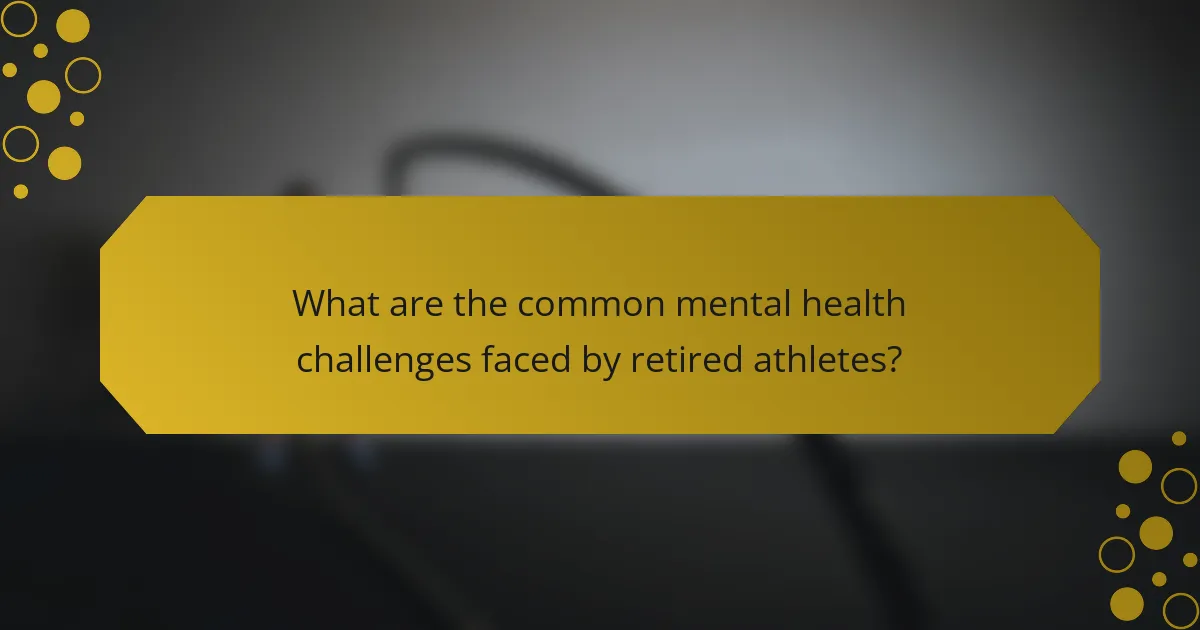
What are the common mental health challenges faced by retired athletes?
Retired athletes commonly face mental health challenges such as depression, anxiety, and identity crises. Transitioning from competitive sports to everyday life can lead to feelings of loss and isolation. Studies show that around 25% of retired athletes experience significant mental health issues, highlighting the need for support systems. Unique attributes include the impact of sudden lifestyle changes and the struggle to redefine self-worth beyond sports. Addressing these challenges requires intuitive learning strategies to foster mental wellness and resilience.
How can athletes identify signs of mental health issues?
Athletes can identify signs of mental health issues through self-awareness and observation of behavioral changes. Common indicators include persistent sadness, anxiety, withdrawal from social interactions, and changes in performance levels. Recognizing these signs early can facilitate timely support and intervention. Regular mental health check-ins and open discussions about emotions can further enhance awareness.
What role does identity play in mental wellness post-career?
Identity significantly influences mental wellness after an athlete’s career. Transitioning from a defined role to a broader identity can create challenges. Athletes often tie self-worth to performance, leading to identity crises post-career. This shift can result in anxiety and depression if not managed properly. Emphasizing personal growth and exploring new interests can aid in redefining identity and enhancing mental wellness. Engaging in community and support networks fosters resilience and a sense of belonging during this transition.

What universal strategies can support mental health in transitions?
Intuitive learning strategies can significantly enhance mental health during transitions. Focus on cultivating resilience, fostering self-awareness, and building supportive networks.
1. Embrace mindfulness practices to reduce stress and enhance focus.
2. Set realistic goals to create a sense of achievement and direction.
3. Engage in regular physical activity to improve mood and cognitive function.
4. Seek mentorship from former athletes to share experiences and coping strategies.
5. Participate in workshops that address emotional and psychological challenges of transitions.
6. Encourage open discussions about mental health to reduce stigma and promote understanding.
How can athletes build a support network?
Athletes can build a support network by connecting with peers, mentors, and professionals. Engaging in community activities fosters relationships that enhance mental wellness during transitions. Joining local sports clubs or online forums provides platforms for sharing experiences and advice. Networking at events can lead to valuable connections and resources.
What are effective coping mechanisms for stress and anxiety?
Effective coping mechanisms for stress and anxiety include mindfulness, physical activity, and social support. Mindfulness practices, such as meditation, help athletes focus and ground themselves. Regular physical activity enhances mood and reduces stress levels. Building a support network allows for sharing experiences and receiving encouragement. These strategies foster mental wellness during transitions.

What unique approaches can enhance post-career planning?
Intuitive learning approaches can significantly enhance post-career planning for athletes by fostering adaptability and mental wellness. Techniques such as mindfulness training help athletes manage stress and uncertainty during transitions. Personalized coaching offers tailored strategies that align with individual strengths and interests. Engaging in peer support networks encourages sharing experiences and insights, creating a sense of community. Lastly, integrating self-reflection practices allows athletes to clarify goals and values, guiding their next steps effectively.
How can athletes leverage their skills in new careers?
Athletes can leverage their skills in new careers by applying their discipline, teamwork, and resilience. These attributes facilitate adaptability in various professional environments. Many athletes transition into roles in coaching, sports management, or entrepreneurship, utilizing their experience to mentor others. Mental wellness strategies, such as mindfulness and goal-setting, further support their success in these new ventures.
What role does mentorship play in athlete transitions?
Mentorship plays a crucial role in athlete transitions by providing guidance and support during post-career adjustments. This relationship fosters emotional resilience and helps athletes navigate identity shifts. Mentors share experiences, offer resources, and facilitate networking opportunities, enhancing mental wellness. Research indicates that athletes with mentors report higher satisfaction in their transition process, showcasing mentorship as a unique attribute in successful post-career adjustment.
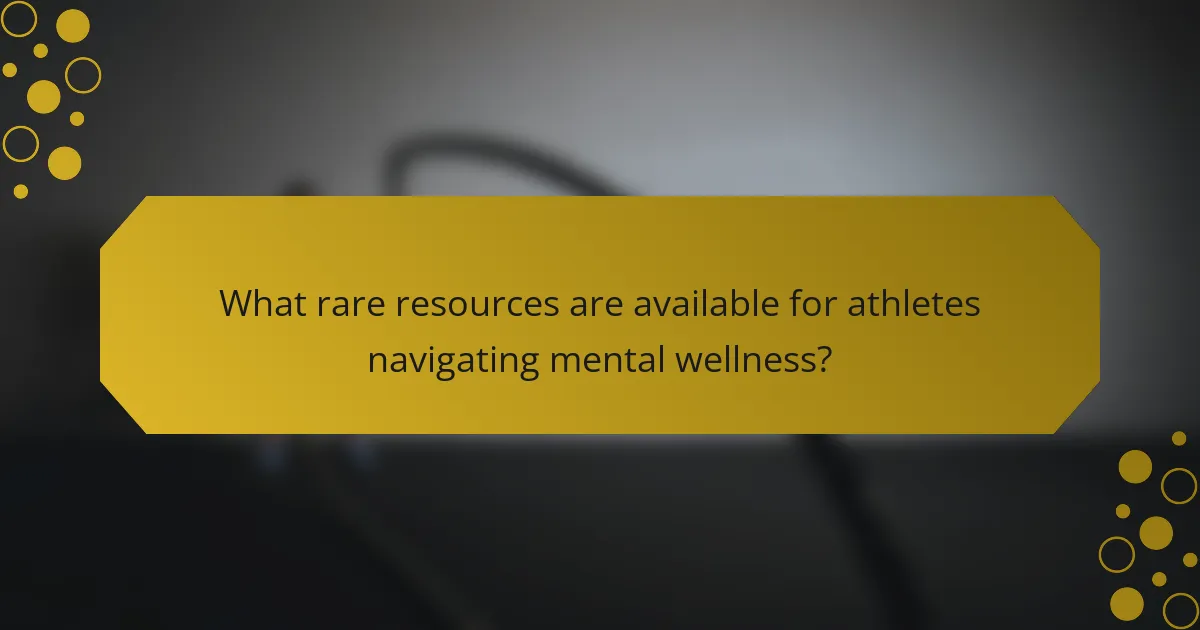
What rare resources are available for athletes navigating mental wellness?
Athletes can access rare resources for mental wellness through specialized programs, peer support networks, and innovative workshops. These resources focus on intuitive learning and adaptive strategies for post-career transitions.
Programs like mental health retreats offer immersive experiences that foster emotional resilience. Peer support networks connect former athletes with each other, providing a safe space for sharing challenges and coping strategies. Workshops led by mental health professionals teach skills like mindfulness and emotional intelligence, which are crucial for navigating mental wellness.
Additionally, online platforms provide access to mental wellness tools tailored for athletes. These resources often include guided meditations, cognitive behavioral therapy modules, and community forums for ongoing support.
These rare resources empower athletes to cultivate mental wellness and adapt to life beyond their sports careers.
What specialized programs exist for retired athletes?
Retired athletes can access specialized programs focusing on mental wellness and career transitions. These programs often include mentorship, counseling, and workshops tailored to address unique challenges faced after sports careers. For example, initiatives like “Athlete Transition Program” provide resources for personal development and mental health support. Additionally, organizations such as “The Professional Athletes Foundation” offer financial planning and career coaching, further enhancing post-career success.
How can athletes access financial planning services tailored to their needs?
Athletes can access tailored financial planning services through specialized firms, workshops, and mentorship programs. These options often focus on unique needs such as income management, investment strategies, and post-career transitions. Engaging with professionals who understand the sports industry ensures personalized advice. Networking within sports communities can also lead to valuable referrals for trusted financial advisors.
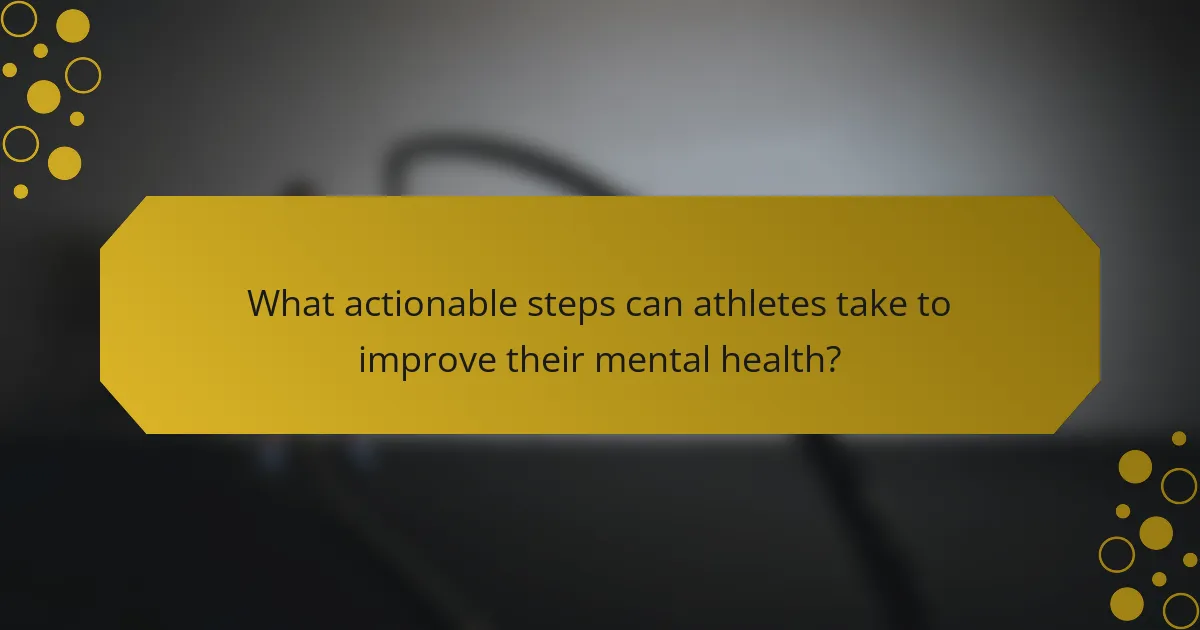
What actionable steps can athletes take to improve their mental health?
Athletes can enhance their mental health through structured self-care, social support, and professional guidance. Prioritize daily mindfulness practices to manage stress effectively. Engage in regular physical activity that is enjoyable and not performance-driven. Build a supportive network of peers and mentors who understand post-career challenges. Seek professional counseling or therapy to address emotional transitions and develop coping strategies.
What best practices should athletes adopt for a successful transition?
Athletes should prioritize mental health, seek support networks, and develop new skills for a successful transition. Embracing these best practices fosters resilience and adaptability.
Establishing a routine helps maintain focus and discipline. Engaging in workshops or training programs enhances career prospects. Networking with former athletes provides valuable insights and encouragement.
Setting personal goals facilitates a sense of achievement outside of sports. Practicing mindfulness techniques reduces anxiety and promotes emotional well-being. Prioritizing self-care ensures a balanced lifestyle during this transition.
What common mistakes should athletes avoid during post-career planning?
Athletes should avoid common mistakes like neglecting financial planning, failing to seek mentorship, and not prioritizing mental health. These oversights can hinder successful transitions post-career.
Neglecting financial planning can lead to financial instability. Athletes should create a budget and invest wisely to ensure long-term security.
Failing to seek mentorship may result in missed opportunities for guidance. Connecting with former athletes or professionals can provide valuable insights into navigating post-career challenges.
Not prioritizing mental health can lead to emotional distress. Athletes should engage in therapy or support groups to maintain mental wellness during transitions.
How can athletes stay connected to their sport while pursuing new paths?
Athletes can stay connected to their sport by engaging in mentorship, coaching, or community involvement. These activities foster a sense of belonging and purpose. Transitioning to roles like coaching can utilize their unique insights while promoting mental wellness. Participation in sports-related organizations or events reinforces their identity as athletes, aiding emotional adjustment during post-career transitions.
